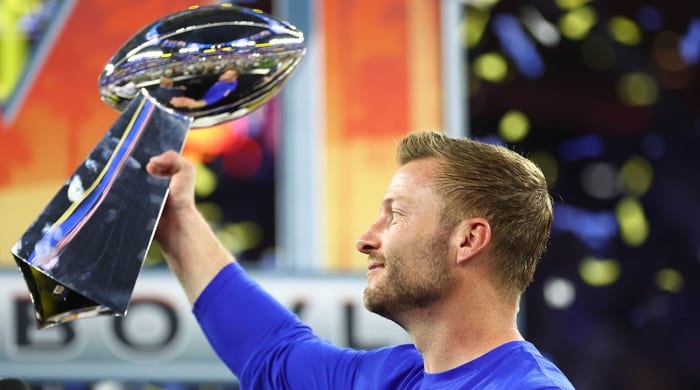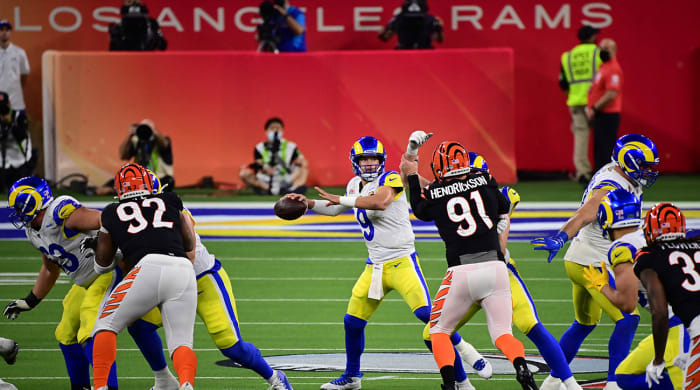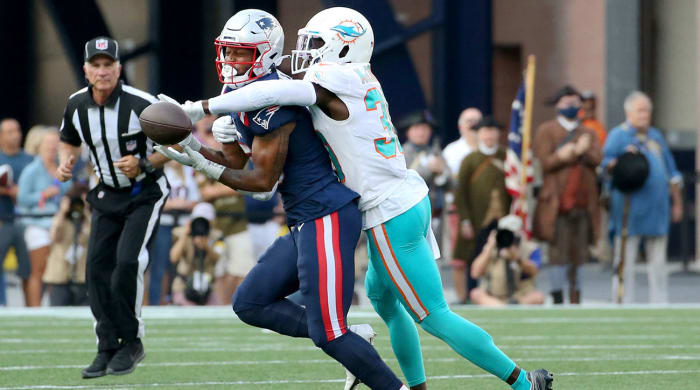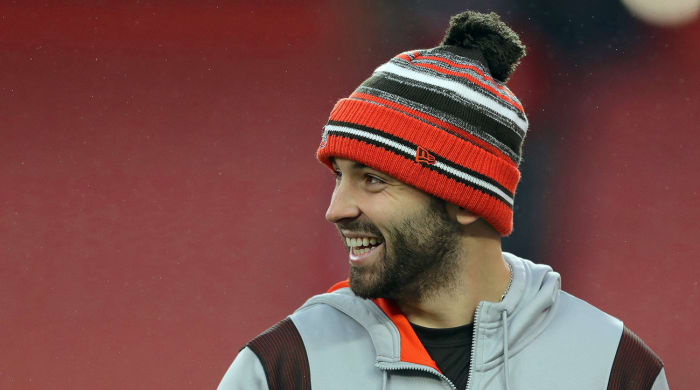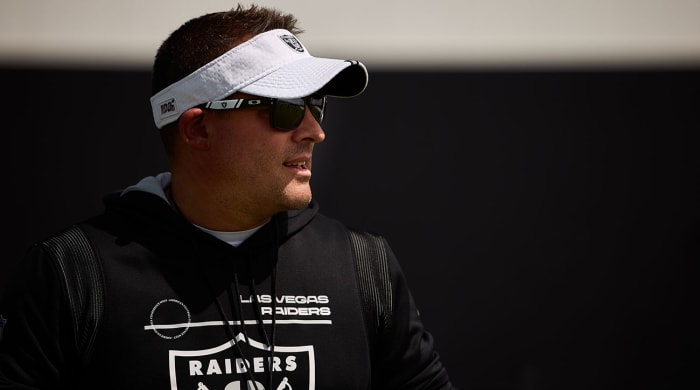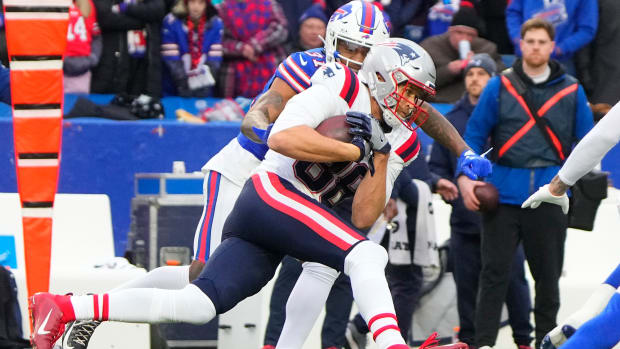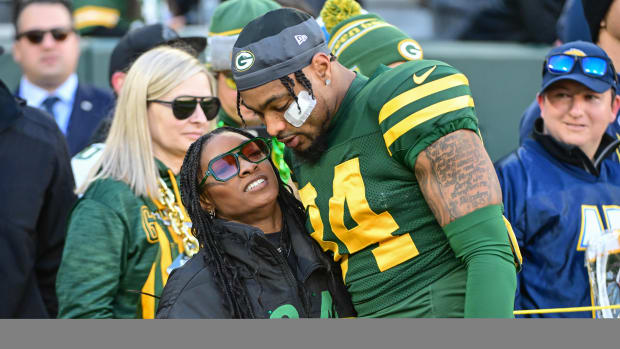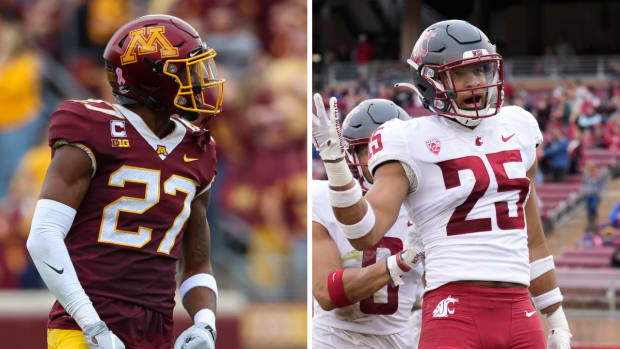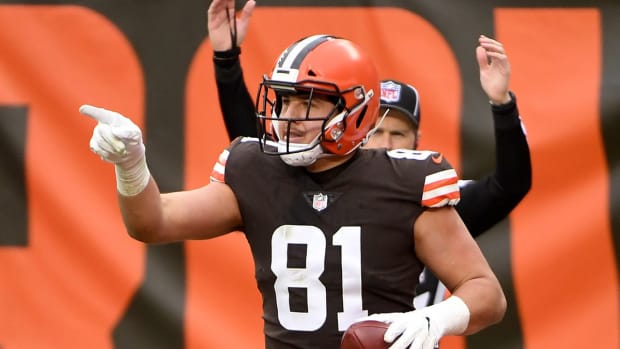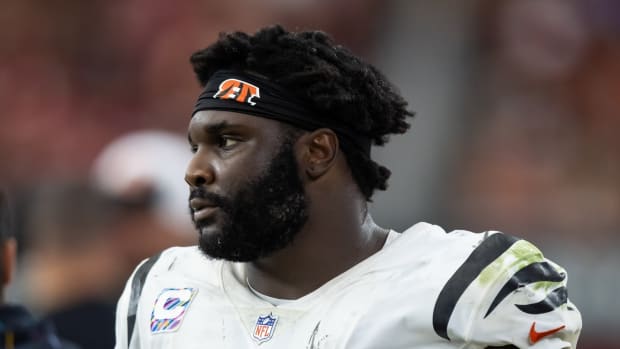Sean McVay Explains Why Returning to the Rams Was an Easy Decision
Sean McVay probably knew the way things were going anyway, but Super Bowl weekend, and the win his Rams capped it with, can mess with a guy’s emotions. So there lingered stray thoughts on what his future held, and whether he should consider the opportunities he’d be presented that would take the whistle off his neck.
That Tuesday, two days after he’d hit the highest of coaching highs, he conducted a wrap-up meeting with the team, and, right after, two heroes of the Super Bowl came to his office. Matthew Stafford and Cooper Kupp had something to say, something that was probably a little more than a request and little less than a demand.
The particulars of the conversation will stay between them. But the message, laced with some colorful language, was crystal clear:
You can’t leave.
“It was really when those guys came in, and I could see how genuine and authentic it was: You can’t not do this,” McVay said. “That was when I looked them in the eye and said, I’m not doing that. And when you tell those guys that, you know, O.K., this decision is final. I think more than anything, all the emotions that are released when you’re able to [win it all], and you’ve got other opportunities, it’s like, Ooh, that’s an exciting option.
“But when you really sit down and think about it, the things I love most about coaching, and then the biggest thing I’d say, Bert, it’s the amount of people that would potentially be affected. … I love coaching. I love working with guys. I love being in the foxhole with the players and coaches. And you can’t mimic and emulate that in a media job.”
On Sunday, the 36-year-old McVay hit the practice field to kick off his sixth training camp as Rams coach. He did it in defense of a world title, and with a résumé unlike any coach his age has ever had in their mid-30s. He did it with a chance to keep building that résumé, and with a chance to, over the next couple decades, chase down the greatest ever to do the job.
But the reason he’s back, and will be on the field rather than in a booth above it in September, has little to do with any of that. And everything to do with guys like the two who burst into his office five months ago.
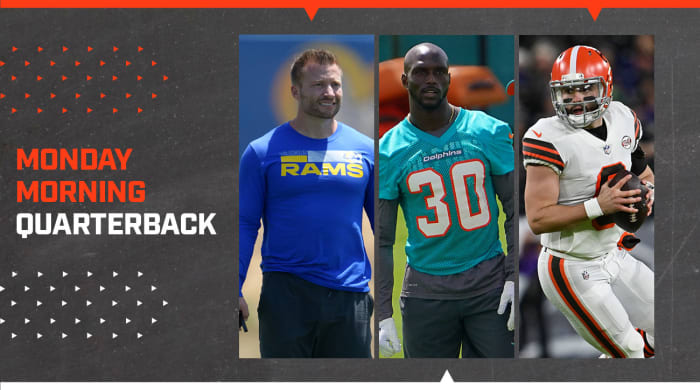
Kirby Lee/USA TODAY Sports (McVay); Jasen Vinlove/USA TODAY Sports (McCourty); Tommy Gilligan/USA TODAY Sports (Mayfield)
Vacation’s over and we’re locked in for the 2022 season. And to kick things off, with my camp trip beginning Monday afternoon, we’ve got a loaded column for you. Inside this week’s MMQB column, you’ll find …
• Insight on Jason McCourty’s decision to walk away from football and into TV.
• Detail on the consummation of the Baker Mayfield trade.
• More on Kyler Murray’s deal getting done.
But we’re starting this season where we left last season, with the world champs.
First, an important point: McVay was never really close to walking away. He never took a meeting with a network and, as we detailed above, his decision was locked in less than 48 hours after he lifted the Lombardi Trophy.
That said, he wasn’t impervious to the way an NFL season can weigh on a coach, nor was he blind to the funny money being thrown around in the broadcast world.
And maybe, if the circumstances around him were different than they are right now, he’d have taken those meetings that network execs were pursuing with him, or even made the jump into what he still thinks will wind up being the next phase of his life. So that it became a relatively easy call in February only underscores how strong the pull to return was—and why Stafford and Kupp approaching him was a perfect manifestation of it.
“Why it wasn’t a consideration for me, not coaching, it’s because of the people, and people like Matthew and Cooper who make you feel like appreciated,” McVay said. “You just feel like you’d be letting people down that you care a whole lot about, whether that be players or coaches. And that was the epitome of it being represented.”
Still, there’s a reason why the idea of walking away at 36 would even be a glimmer of a thought in the coach’s head. He, and the Rams, given McVay’s natural breakneck work pace, have had their radar up for burnout for a while. He and I talked about it last summer. A year later, his handling of a very different offseason shows how conscious he is of it.
And what he’s seen his new wife Veronika, born and raised in Ukraine, go through over that time had its way of driving the point home.
Veronika’s father, stepmother and brother all still live in Ukraine, and her dad chose to stay when the Russians invaded 11 days after she watched her husband win the Super Bowl.
“What happens is you feel terrible about what’s going on with Ukraine, but unless you have family there or it touches you in a very personal way, most people, their lives move on, which is an unfortunate thing but it’s the truth,” McVay said. “Not with us. This is an everyday part of our lives. That’s her family that’s there, that’s the country she grew up in and it’s been heavy to say the least. But she’s been incredible with the way she’s handled it. …
“With everything comes perspective, and stuff that I’ve typically gotten upset about, you start to really say, Does a bad third-down play-call or a couple things that go wrong in our line of work, is that really that big a deal, relative to some of the real s--- we’ve seen that affects my family? Because her family is my family.”
That perspective, McVay thinks, has led to a little more balance in his everyday life—and more effort to just be as present as he can be wherever he is, be it at work or otherwise.
The best example probably came over the three weeks right after the Rams broke for summer. McVay and Veronika were married in June and took that time to honeymoon in the south of France, working their way through Saint-Tropez, Ramatuelle, Cannes and Antibes. The coach says now it’s as unplugged as he’s allowed himself to be in, well, forever.
Even in those spots, though, he won’t completely shut his brain off from work. That, in fact, is usually when he does his reading, and that reading—“I enjoy it as a relaxing exercise”—can go back to his life’s work, and it did as and he and his wife traveled through Europe in June and July. He wound up rereading Phil Jackson’s Eleven Rings, and interestingly enough it drove home, again, that idea of being present in whatever he’s doing.
“There was such a personal touch he had, and he was so himself,” McVay continued. “I think it was more about how you focus on being right here, right now. And it really just reiterated a thing we’ve talked about over the last year, just be present, be in the moment, not worrying about what’s behind or what’s ahead, just focus on the task at hand, and be able to have the mental control and capacity to enjoy every day and stack those blocks.
“But the presence, the connection, the personal touch he had with the guys, it just gave me an appreciation for why he’s been so successful.”
And, in a roundabout way, an appreciation for what he has around him now as he sets off to do what Jackson did over and over—try to successfully defend a championship.
In the bowels of SoFi Stadium on the night of February 13, McVay told me what made the Super Bowl so special, for him, was that on that Rams team, “everybody wanted it more for somebody else other than themselves.” And five months later, he sees that as a reflection of his own growth—in that he’s taught himself to look places other than the scoreboard to find fulfillment in what he does.
“The coolest part of all of it was seeing how happy it made other people that you wanted it for,” he said. “For Andrew Whitworth, for Aaron Donald, to watch Matthew Stafford be able to win, to see some of our other coaches, like, I think what you realize is it’s an amazing thing when you do it with people you really care about, and this was the closest team we ever had. It was the best leaders that we’ve ever had. It was really fulfilling.
“I’d say for me personally, a lot of narratives maybe changed, but you realize, you gotta be careful to not get too caught up in that, because there are just so many things that can occur that are out of your control. More than anything, when it becomes less about you and more about the people that you care about, that to me is what’s really fulfilling. … Like I’d told you, Albert, I had lost my way a little bit in the ’19 and the ’20 seasons. You forget about why you love coaching so much. It’s because you’re doing it to pour into these guys.”
In turn, McVay has found, they wind up pouring into the program and that has put the coach in a healthier place, too, more able and willing to delegate more and micromanage less, because he’s got a crew of players and coaches around him who can carry their weight.
And Stafford and Kupp were in the middle of another great example of that back in March.
Odell Beckham Jr. was a free agent and had torn his ACL. The Rams had agreed to trade Robert Woods, coming off his own ACL injury. Van Jefferson had knee surgery, albeit a less-serious one, too. So the quarterback and his star receiver went to McVay not just looking for reinforcements, but with a specific target in mind—Allen Robinson. The Bears’ free agent was in-division with Stafford for years, and was a bigger target, similar to some of the best receivers Stafford played with in Detroit.
McVay’s immediate reaction to Stafford and Kupp was simple, “We won’t be able to afford him, no f---ing way.” But Von Miller’s unexpected departure cleared cap space, the market for Robinson dropped out, and Stafford and Kupp stayed after McVay on the idea. And soon enough, McVay was putting together a teach tape for Robinson, and he and Stafford jumped on a Zoom to try to get Robinson to back out of a verbal commitment to another team.
“I was selling my f---ing balls off to this guy,” McVay said.
The Rams, of course, got Robinson. But, to everyone involved, from a global perspective, the whole thing brought to life the trust the coach is putting in his players, and the ownership they’ve gotten in the program as a result of that.
“And that’s where the more you get comfortable with people, the more comfortable they are with really being able to help,” he continued. “Then you can have it where they know, I’m really gonna listen to you. That’s really where things come to fruition. It’s when you’ve got two guys, hey, they had such respect for Allen Robinson, and then you start seeing it through their lens, and you realize, Man, these guys are as important as anybody.”
McVay let that spill over into his coaching staff, too.
After offensive coordinator Kevin O’Connell left to take the Vikings’ job, and the Rams brought Liam Coen back from Kentucky to replace him, McVay moved to give running backs coach/assistant head coach Thomas Brown more responsibility—so he made him the team’s tight ends coach to replace Wes Phillips, who’d gone to be O’Connell’s OC in Minnesota. That, of course, left a running backs coach job for McVay to fill.
“It’s like, Who’s a better running backs coach than this guy?” he said. “So who should I appoint to find the next running backs coach? It’s him.”
So McVay put Brown in charge of lining up candidates and running interviews, which led Brown to recommend TCU assistant Ra’Shaad Samples. McVay and Brown then did a second interview with Samples and hired him. Similarly, McVay let defensive line coach Eric Henderson find an assistant D-line coach in 2021. That coach, Marcus Dixon, went with Ejiro Evero (hired as DC by new Broncos coach Nathaniel Hackett) to Denver in February. And so who would McVay charge with replacing Dixon? Henderson, of course.
“When you have the right types of people, you can empower them to onboard other great people like themselves,” McVay said. “And then when they feel that ownership they genuinely have as a result of, Hey, I’ve made this hire, well, now they’re even more bought into seeing that person succeed.”
Which, ultimately, leads to everyone succeeding, and more feelings like the one McVay had looking around the field after the Super Bowl.
Truth be told, the dynamic of being able to efficiently backfill jobs as they come open hasn’t just been a plus for McVay and the Rams. At this point, it’s become a necessity.
Last year, he was replacing defensive coordinator Brandon Staley a year after hiring him. This year, he’s replacing O’Connell after two. And as long as the Rams keep winning, and McVay’s assistants keep thriving elsewhere, L.A. going to keep having what can be best termed a champagne problem—defensive coordinator Raheem Morris is on the doorstep of a second shot as a head coach, and Coen and Brown probably aren’t far off, either.
And sure, it’s challenging to have to keep the well deep. But in an interesting way, it’s also given McVay more proof that the fire he needs to coach is still there. Because it’s where his passion, curiosity and interest in football itself is so evident.
“Do I love guys leaving all the time? Yeah, it’s a strain,” McVay said. “But also, in a subtle way, it’s a way of me reinvigorating myself every year where you’re learning to work with new people. These guys have different ideas, and you’ve always gotta adjust. If there’s one thing I learned getting my face peeled off in that Super Bowl a few years ago [LIII against the Patriots], it’s you better have some different ways of doing [stuff] and some solutions that maybe you hadn’t thought of. And the best way to do that is get exposed to other great coaches.
“Selfishly, when I saw USC hired Lincoln Riley, I’m like, Hell yeah, I’m gonna pick this guy’s brain. I’m excited to learn from this guy. And as long as I’m in that place, that’s when I know there’s no doubt in my mind I wanna coach. As soon as you start losing that intrigue and the excitement of working with people, and trying to help them, then it’s like, Alright, maybe it’s time.”
And just as McVay’s getting all that from those around him—Staley and Morris have morphed the defense into the Rams’ own version of Vic Fangio’s scheme the last two years, and O’Connell helped McVay diversify the offense to get the most from his quarterbacks—there’s a pretty obvious way he’s giving back to them.
“Raheem wanted to be here. Liam Coen knew, Hey, I could be a college head coach in a year but I like it in L.A.,” he continued. “And if you want to keep growing in this profession, this has been a good place to be.”
The challenge for all of them, then, as they challenge each other to make the program better, comes back to the opportunity that kept McVay on the sideline.
He and his staff understand what’s in front of them. Stafford’s 34, Donald’s 31, Kupp’s 29 and Jalen Ramsey is 27. All four are among the best in football at their positions, and still riding the prime of their careers—all but Stafford made first-team All-Pro last year, and you could say Stafford made up the difference in the playoffs. All four are paid as such.
And more than just the talent, and each of those guys has plenty, all showed their mettle last year when it looked, on the outside, like the Rams might be the latest so-called superteam to circle the drain. “The three-game losing streak [in November] was miserable,” McVay said, “but watching the way our guys stayed together, that was fulfilling for me, and that’s where you just know you love it.”
So now it’s on those coaches to continue to get the most of that group, and everyone else around them, while the championship window remains open.
“I’m very aware of what a special opportunity it is to work with people like Matthew Stafford and Aaron Donald, and some of the other guys that we have,” he said. “And so as a result of that, does that make you appreciate what you have that much more? Yes. How does that affect me? It’s hard to say.”
Taking all of this into account, if I had to guess, I’d say it affects McVay in two ways.
First, it creates a positive sort of urgency for him and his staff to do everything scheme-, play-calling, and game-planning-wise to get the absolute most out of the guys they have. Which is why when I asked McVay if he thinks Stafford, in Year 2 of their partnership, has another gear in his game they haven’t hit yet, he responded, “The answer is yes.”
Second, my feeling is there’s a likelihood that McVay’s own longevity as Rams coach is tied to that group. When they start to filter out of the league, it’d create the natural point for McVay—who’s been open about eventually wanting to take a breather from coaching, and maybe be around more when he and Veronika have kids—to go into the media. Maybe it’ll be a year from now. Maybe it’ll be five years from now. But that’s where I think this will go.
For now, though, there’s not much time to worry about that.
So if all of this isn’t about the scoreboard, and it is about the people around him, and getting the most of everybody, was there a moment on Super Bowl Sunday to show it for McVay?
Actually, there was, and it’s the one that’s become synonymous with that game.
Second-and-7, 3:06 left, the Rams down 20–16, and with the ball on the Bengals’ 46. The call, as McVay describes it, was designed to attack underneath coverage in a two-high defense, which the Bengals showed presnap, with a high-low concept—Brycen Hopkins would run his route underneath Kupp’s deeper in-cut and make the defender there choose. The problem was, at the snap, Vonn Bell came down to cover the hash Kupp was running to, alleviating the one-on-two conflict the call was meant to put Cincinnati in.
“That was a sh--ty play-call on the no-look pass,” McVay said, laughing. “But Matthew finds a way to move the hook player right as he drops down right into the window that we’re hunting up, and he makes the 22-yard completion on what probably was one of the worst play-calls that you could have for that coverage that [Bengals defensive coordinator Lou] Anarumo dialed up right there.”
As McVay explained, I stopped him—one of the biggest moments of his coaching career was delivered on a call … he wishes he could have back?
“Oh, dude, there are answers,” he continued. “But if you’re really doing a good job calling plays, the ball is going to the primary guy and you’re attacking certain coverages. If you said, Hey, for that play-call, with the primary concept that we had on right there, is that a good call? There were answers, but it’s like, No, that’s not a good call. You’re hunting up split-safety coverage right there, and Matthew just made it right.”
The obvious takeaway there goes back to having special players who can make a coach right even when he’s wrong. Stafford didn’t no-look Bell to show off. He did it with intent and, if you look closely at the play, you’ll see he moved Bell, who actually did well to try to play it both ways, just enough to get the ball in there.
“I talk about competitive greatness with these guys all the time,” McVay said. “And our guys shined brightest when they had to. Everybody talks about superteams, we got Ben Skowronek and Brycen Hopkins at receiver and tight end, we got Van Jefferson on a bum knee, and we got our running back coming off an Achilles on the Super Bowl–winning drive. Who ended up being the guys that shined brightest? Matthew Stafford and Cooper Kupp.
“That was the coolest thing.”
The less obvious takeaway from that moment, for McVay, had to do with the margins, and how easily the whole thing could’ve gone the other way. If Stafford hadn’t no-looked Bell, then the Rams would’ve been in third-and-long, and the rest of the game might’ve played out differently, just like if Donald hadn’t been there to pull Joe Burrow’s eyes down on the next possession, maybe Burrow would’ve hit Ja’Marr Chase for a game-winning touchdown in the final minute.
McVay would like to think he’d see last year’s team the same way—“That team, they loved each other, man, you can’t fake the s--- that these guys were feeling”—even if it had gone the other way. It is, of course, hard to say for sure whether he would.
But the one thing he is certain on is the result didn’t change much on how he saw them, the players and coaches, as people.
“There’s a lot of different ways you can look at it, but you’re either helping people get better and you’re helping situations get better or you’re not,” McVay continued. “And that’s the epitome of it to me. And I am on a constant journey of trying to be a good leader, and when you’re doing that, it becomes less about yourself, and more about those people that you really love and care about.
“That to me is fulfilling. Is it a lot more fun to win? F--- yeah. No doubt about it. But it’s also fulfilling when you know, like, Hey man, you’re doing everything you can to help Matthew Stafford or Cooper Kupp or Ramsey or Aaron Donald or Leonard Floyd, whoever it is, reach their highest potential. Or you’re positively pushing these coaches.”
That’s why, really, there’s no place McVay would rather be right now than right where he is today, on a practice field at camp in Orange County, worrying only about today.
The results, if his track record’s any indication, will come.
Which is good reason why Stafford and Kupp were never going to let him leave in the first place.
WHY JASON MCCOURTY STEPPED AWAY
Earlier this year, knowing his brother might hang up his cleats, Patriots safety Devin McCourty sparked an idea with their marketing team at Malka Sports and started to reach out to Jason’s ex-teammates across the league to execute it. The idea was to put together a compilation of messages and memories for Jason, if he did retire, to watch.
Jason McCourty saw it a couple weeks back.
“I sat there and listened to a bunch of guys say nice things about me, and Chris Hope described me and he said, having a son, ‘If my son can grow up and be the kind of man that J-Mac was, that would be 100% O.K. with him,’” McCourty said Thursday. “For me, for my teammates, I just wanted to always be a guy that was gonna be consistent each and every day. And when I say consistent, that's the same level of energy, the same level of leadership, no matter what was going on.”
Monday morning, McCourty’s kicking off a new football career of sorts—this one as an analyst on NFL Network’s Good Morning Football—just 12 days after he announced his retirement.
We’ll get to where he’s going with that in a second, but it’s important, first, to establish that for McCourty, even though he’d been thinking about walking away since he underwent Lisfranc foot surgery in November, this was no easy call. He initially hurt the foot in October, and what followed was a process that was grueling mentally even more so than it was physically.
When he’d signed with the Dolphins in 2021, after three years with his brother in New England, the idea was that it’d probably be his last stop—a fun place to cap his career, and for him, his wife and three kids to live for a year or two. Having what would be his final season cut short put that plan, and McCourty’s head, in a blender in first few weeks post-op.
“I get hurt seven games into the season and mentally, I’m kind of spiraling a little bit, with just that thought process,” McCourty said. “The poor-little-old-me kind of thought process of, Man, I only wanted this one last season. What is it that God is trying to say to me? What is it? And my wife kept saying to me like, Hey, just give it time. Everything works out for a reason.”
As it turns out, being in Florida wound up being fortuitous for McCourty for reasons he couldn’t have envisioned. It just so happened that Kaleb Thornhill, the Dolphins’ director of player engagement, was staging a business combine in Fort Lauderdale in March, and told McCourty he should come out for it. There, McCourty got to explore a number of different potential post-football careers—meeting and getting to hear from players who’d become entrepreneurs, and successful people from the worlds of real estate and venture capital.
That experience led to McCourty signing up for the NFL’s April broadcast bootcamp. He’d already done some media—he and Devin host a podcast, had guest hosted First Take on ESPN, and were co-hosts on my buddy Tom Curran’s popular Quick Slants program, while they played together as Patriots, on NBC Sports Boston—and was curious about taking on more. So he called old Titans teammates Harry Douglas and Wesley Woodyard to pick their brains on it, and talked with Maurice Jones-Drew and Mike Robinson at the bootcamp.
“And that just sparked so many different opportunities and conversations,” McCourty said. “I just felt like the injury, leading up to the different things off the field, as time went by, it was just like, The only reason I'm still thinking about playing is the fear of not playing. I think that was just a realization, as all these moments started to accumulate, it was just like, Yeah, it's been a great run but it's time to go ahead and move on.”
So the decision came gradually, without any sort of Eureka moment. Sometimes, a job offer in the media can hasten a player’s decision to walk away. And while that wasn’t the case here, McCourty will concede that having the opportunity he does in front of him did simplify the decision to leave the playing field.
“In the beginning, when I started thinking retirement, I wasn't sure this exact opportunity was going to be there,” he said. “But I had an idea that there were going to be some opportunities, and I think that made it easier to make the decision. I always knew it, my biggest fear with walking away from the game was going to be the idle time. So for me, being able to develop some purpose and just have a job and something to keep you busy, with work and preparation and all of that, made it easier to come to the decision.”
Now, of course, he’s got big shoes to fill—there’s a reason Nate Burleson graduated to a Michael Strahan–type of role at a legacy network. But I’m pretty sure anyone who’s come across him, or his brother for that matter, wouldn’t have any doubt he’ll be up for the challenge.
Here are a few others things to chew on from our conversation …
The hardest thing about walking away for McCourty is just that—and knowing he’ll never actually get to play football again. That, to be sure, is something he struggled with, and something that hit home again when he watched the retirement video Malka put together for him, one that recapped his life in football and was narrated by his kids. “My wife had tears in her eyes, watching that, it was just like, it felt real,” he said. “Because as you’re watching it, you know there is no pickup football. You can’t go to the park and ‘Hey, let’s get some guys together and get some pads on and go play football.’ So I think the toughest part is the finality of it. I’ll probably go out and visit Dev at training camp at some point throughout the summer, and going out there and knowing like, That doesn’t exist anymore. … I think that was the hardest part of knowing, hey, once you hang them up, there’s no going back — unless you’re [Tom] Brady.”
While his favorite memory is winning Super Bowl LIII with his brother, he still considers Nashville his football home. “As any kid can imagine, you have a sibling that’s close in age, let alone an identical twin, and you got to play together and win the Super Bowl together like that. That’s a storybook ending,” he said. “So that was the most fun. But Tennessee is home. If somebody asked me, I’m a Titan. Tennessee was eight seasons, had to endure a lot of losing but felt like we were putting bricks in that building. I got married in Tennessee, had all three of my kids, so that’s home. But Tennessee and New England, those are the two places for me. One was home. One was the most fun I’ve had playing football.” And, for the record, he did bring up the 0–16 season in Cleveland, if only as something he doesn’t like talking about much.
He won’t call them regrets, but there are two things McCourty wishes he accomplished as a player. One is getting to 20 career interceptions. He finished with 18 and, he says, “I can probably pull up 10 interceptions that I dropped throughout my career.” The other is not making a Pro Bowl—he was an alternate two or three times, and felt there were a few years where he played at the level of one.
“Cortland Finnegan and Chris Hope were my two guys when I got there to Tennessee,” he said. “I probably wouldn’t have made it 13 years without those two guys. I remember having a conversation with Cortland Finnegan when he was done. He was a seventh-round draft pick out of Samford, and I remember him saying like, I can never say anything bad about my career. He was just like, I far exceeded any expectation I could have set forth for myself when I first was drafted. So for me, sixth round, I thought I’d be an O.K. gunner in the NFL for a season or two. And I far exceeded that.”
If he’d come back, it would’ve only been with the Dolphins. He and his wife had discussed it, and the fact that the defensive staff in Miami survived Brian Flores’s firing in January did make it enticing—McCourty loved playing for those guys. And to keep the door ajar, he and new head coach Mike McDaniel met and kept a dialogue going. In the end, he decided grinding through the first year back off surgery was too much, but that doesn’t mean the chance to stay with the Dolphins wasn’t worth considering. “I’m excited for him and those guys down there in Miami,” he said. “I will say, going down there for my last year, some of the best people in football I was able to meet. Obviously, the guys in the locker room, but just everybody within that organization. I was very fortunate to be able to spend my last year down there.”
McCourty’s brother Devin was more of a sounding board than anything for Jason through the process, which is reflective of the relationship the two have had over the 12 years they were playing in the league together. Jason admitted it might’ve been cool for the two to go out together—but that really was never part of the plan. And so now there’ll probably come a day when Jason has to go on TV, and critique his brother. “For me, it’s going to be cool to be on the other side,” he said. “I already told him, if he goes out there and stinks it up, I’m going to be on the TV screen Monday morning talking about how bad he played. I’m not holding anything back.”
And that takes us back to what Hope said about McCourty, and the legacy he’ll leave after 13 years as a player, as tries to carve out a new niche on the airwaves. As he said before, his hope is, with younger teammates, he left a lot of what Finnegan and Hope did for him—good memories, and lots of lessons to draw on.
If he accomplished that? Well then, as he sees it, his impact will have been lasting, and worthwhile.
“There were times in my career where I was the starter, I got hurt and then I was no longer a starter. Toward the end of my career in Tennessee, I started rotating where I was used to being the No. 1 guy,” he said. “Getting to Miami, we drafted a young kid, Jevon Holland, and I started out at free safety and he was inserted into the role. Or being in New England, and J.C. Jackson comes in and has three interceptions as a rookie and then he starts to take off so he’s playing a little bit more.
“It always mattered to me most in those moments of adversity, when things aren’t going right, and your teammates are looking at you for the J.C. Jacksons, the Jevon Hollands, would they look at me and be like, Alright, J-Mac's the same exact guy—he's helping me just as much today as he was yesterday when I was his backup? That always meant a lot to me.”
I think it’s pretty safe to say those guys would. And my guess is his new colleagues in the media will probably feel the same way about him soon.
Good luck today, Jason.
TEN TAKEAWAYS
A key to the Baker Mayfield deal getting done was that the Panthers basically got three weeks of runway to talk to him before Cleveland and Carolina consummated the deal. Browns GM Andrew Berry initially gave the Panthers’ brass permission to talk to Mayfield as soon as the sides came to a basic agreement on compensation (a 2024 fifth-round pick that becomes a fourth-rounder if Mayfield plays 70% of the snaps this season), which was the week of Carolina’s veteran minicamp in June. From there, coach Matt Rhule talked football with the quarterback, while GM Scott Fitterer kept him abreast of the business side of it, while emphasizing to him that he’d have to earn the job, but that this would be the best place, alongside guys like Christian McCaffrey and D.J. Moore, to bet on himself.
By then, whereas Fitterer and Rhule were once lukewarm on the idea of trading for Mayfield, a closer look at his 2020 tape, with the acknowledgment that his ’21 was sideways, got the Panthers believing that just as this could be a really great opportunity for the player, it was going to be a pretty good swing for the team to take, too. Add that on to conversations Rhule had with Mayfield’s college coach, Lincoln Riley, and the logic is that, with Mayfield in a competition with Sam Darnold and Matt Corral, the Panthers get three good swings at getting the position fixed, with Mayfield helping to provide a higher floor at the position than they had last year.
And because they’ve been talking with him for a while—those conversations also helped to convince Mayfield to take a little less money (another bet on himself) to make the trade happen—there’s a pretty good feeling, or at least a better one, that they know what they’re getting in a player who’s pretty well-known for his reaction to those who slight him.
We covered the Cardinals’ contract with Kyler Murray in Friday’s GamePlan, and one thing I left on the cutting room floor—but maybe shouldn’t have—is how it should be satisfying for a lot of people in Arizona. And that’s mostly because it took a string of gutsy decisions in 2019 to get here.
• First, there’s the one Murray himself took in walking away from a potential career in baseball, after being drafted ninth by the Oakland A’s the June before. It seemed risky at the time. Baseball is not as hard on an athlete’s body. There are guaranteed contracts there. Careers generally last longer. And yet, Murray went the other way, and it paid off—the five-year, $230.5 million extension he landed, at 24, is the kind stars in baseball usually don’t get until they’re right around 30. By then, if things go well, Murray could be negotiating another big contract.
• Second, there was the Cardinals’ decision to hire Kliff Kingsbury, which led to the decision to take Murray No. 1. Now, the jury may still be out on Kingsbury. But half of the 2019 class of eight coaching hires have been fired already, and the former Texas Tech coach made the playoffs last year. Which signifies that the hire itself, for a franchise that was stagnating, has worked out fine and made Arizona a unique, and challenging, team for others to deal with.
• Third, there was the call by GM Steve Keim to pull the plug on Josh Rosen just one year after the Cardinals took him 10th. It was unconventional, seemed rash and wound up being 100% correct.
And obviously, if Kingsbury and Murray, attached at the hip, as they’ve been from the jump, don’t take another step, all this will be assessed in a different way down the line. But for now? The Cardinals, through all those decisions that were made in 2019, have given themselves a chance.
The NFL’s de facto minor leagues are in the most significant turmoil they’ve faced in my lifetime. The transfer portal has ushered in de facto free agency. Name, image and likeness legislation has opened the floodgates for players, finally, to get paid—and those guys are oftentimes being paid for their reach more so than the results they’re getting on the field. And the SEC and Big 10 have swallowed up Texas, Oklahoma, UCLA and USC to get to 16 teams each, with speculation rampant now that they may not be done poaching. So I figured this was a good time to ask a few GMs whether, as they see it, this will eventually have trickle-down (or up?) effect on the NFL.
NFC GM: “I don’t have a strong opinion. I think it’s just going to tell us more about the kid’s makeup, his personality. Is he going somewhere for the money, or is he going where he can help a team and develop best? That’s the thing with the guys that jump in the portal. You want a guy that’s committed to football, not driven by money, but because he wants to play. From that standpoint, it might make it easier to find out.”
AFC GM: “Honestly, I don’t have a good feel for it. My guess is a bigger portion of the NFL will come from these mega-conferences now, especially with it being so easy to transfer, and with the NIL money these schools will have to outbid schools from the lesser conferences. Kids are gonna chase the money.”
AFC GM 2: “Honestly, I think the impact will be minimal. If anything, it probably consolidates the top prospects even more so than the traditional Power 5, and puts good vs. good more often from a scouting perspective. I think the financial ramifications will be bigger. Presumably, the increased revenue will filter down to NIL budgets over time, which continue to accelerate the professionalization of college athletics. And we’ll continue to see a new breed of rookies more adept at handling the business side of the sport [and perhaps enhancing players empowerment and entitlement].”
I think predicting Sue Robinson’s decision timeline is a fool’s errand. One of the first things I heard coming out of Deshaun Watson’s hearing, almost a month ago now, was that the former U.S. District Court judge was not pleased with how public the NFL’s position on sanctions had become (though I don’t know that anyone who follows this stuff was even mildly surprised that the league would play the public relations game aggressively). And that’s why I’m not sure Robinson would care about getting anything done before camp (if she did, she’d probably have issued her ruling before Watson reported) or helping the NFL bury the news by releasing it on a Friday afternoon. So that’s my way of saying that I think this thing could come in 10 minutes or 10 days.
When it does, things will get really interesting—and that’s pretty much regardless of which way Robinson rules. If Watson gets a year or an indefinite suspension, you can count on his camp fighting that. If it’s less, will the NFL wage war? That, to me, is a lot less certain. Yes, Roger Goodell has the right—as long as Robinson’s decision isn’t zero sanctions for Watson at all—to overrule the initial recommendation, or appoint a designee to do that. But there’s some downside to doing that, if you’re the league. One, you’d potentially wind up in another court battle with another player. Two, you’d be undermining a process that you negotiated just two years ago, and a process that a lot of owners, who wanted the league to lessen (not strengthen) its role in discipline, gave their full-throated support to. That’s why, in the end, if this winds up being a six-, eight- or 10-game suspension for Watson, I can envision a scenario where the league points back to what it wanted, something everyone’s aware of now, since they already played that public relations game, says, We tried, and moves on.
I had a leftover from my Raiders story in May that I wished I’d gotten in—because I think it reflects another area where Josh McDaniels has grown since his exit from the Broncos. And it goes back to the relationship-building that he and GM Dave Ziegler have prioritized since getting to Las Vegas. But it also acknowledges that it’s easy to do all this in the spring, when guys are healthy and no one’s lost a game. “They [need to] know you know who they are already. And they [need to] know you care about them on a daily basis,” McDaniels said. “It’s not as hard as it sounds like it might be. The reality is you have to believe in it, which we do, and we’re gonna be consistent with that approach. And if we lose a game, we’re still gonna be consistent with it. I’m not gonna come into the squad meeting and throw the monitor. No. It’s like, Hey, we didn’t do A, B and C well enough to win, and here’s what we’re gonna try to do to fix it, but I loved our effort, and let’s learn from it.”
I’m not sure the 32-year-old McDaniels had the perspective to be that level-headed in Denver. The 46-year-old definitely does, and that should help his team through the grind of playing in this year’s AFC West. (I also think they’re probably going to be pretty good.)
We’ve got two housekeeping announcements from the NFL as camp starts. You’ll probably hear more about these through Monday morning …
• The league’s launching its own streaming service Monday, one called NFL+. The idea, it seems, is similar to some other streaming services (ESPN+, Disney+, Paramount+, etc.), where you’ll be able to stream out-of-market preseason games, local and prime-time regular-season games, and get access to NFL Films archives and NFL Media programming. That basic package is $4.99/month or $39.99/year, with the premium tier, which includes full game replays (with coaches film included), at $9.99/month or $79.99/year. It’s not the NFL’s first foray into creating this sort of thing—the NFL launched NFL Now as an OTT years ago, and is calling this, in its announcement, the next evolution of NFL GamePass (which won’t be available in the U.S. anymore to make way for NFL+).
• The league is rolling out its alternate helmet launch for the start of camps Monday. Thirteen teams will have a second helmet in 2022. Nine will have new alternate helmets (Bears, Bengals, Cardinals, Commanders, Eagles, Jets, Panthers, Saints and Texans), and four will wear throwback helmets (Cowboys, Giants, Falcons and Panthers). You’ll see some on practice fields this week (the Texans and Bengals are committed to wearing theirs for this Saturday’s practices). For what it’s worth, we already know the Bucs are going to add creamsicle throwbacks for ’23. And here’s hoping the Broncos bring back their old colors, too.
The next 2–3 weeks are critical in the Jimmy Garoppolo saga. The 49ers’ quarterback is throwing again, but likely won’t be cleared to fully participate in practice for another two or three weeks, which creates a sort of window for San Francisco to be patient, and for other quarterback situations to play out across the league, with the Niners’ and Garoppolo’s hope being that something materially changes (either via injury, or because someone’s quarterback situation isn’t what they thought it was in the spring) elsewhere to create an opportunity for him to start. Is it risky? Sure. Letting this drag into camp isn’t great, and could create an actual problem if Trey Lance hits a rough patch over the next couple weeks. And even if there’s a taker, Garoppolo has control in that he’d have to be willing to renegotiate his contract to facilitate a trade (unless there’s a team out there willing to take on all of the $25 million he’s due, which is doubtful). But I’m not sure the Niners have many other options here. The timing of Garoppolo’s shoulder surgery put them in a bind, and now they have to make the best of it.
The Patriots’ 2019 draft is a good illustration on why the team is where it is right now. Yes, part of the challenge for New England the last couple years has been, well, the fact that the greatest player in league history isn’t around anymore. But nearly as significant has been the struggle to put enough around whoever’s playing quarterback. And with N’Keal Harry traded, the Patriots are down to just four of 10 draft picks left from 2019, with players from that class entering Year 4. Two of those four (backup OL Yodny Cajuste and backup CB Joejuan Williams) are no locks to make the team. And after that, you’ve got a running back and a punter (both Damien Harris and Jake Bailey, to be fair, are really good players). Worse, this isn’t exactly an isolated thing. Consider this …
• Over Bill Belichick’s first 13 years as coach, the Patriots had 13 first-round picks. Eight of the 13 became Pro Bowlers. Another four became productive long-term NFL starters, leaving Laurence Maroney as the only real bust.
• Since then, the Patriots have had seven first-round picks, and none has been selected as a Pro Bowler (Mac Jones went as an alternate last year). And only three of those seven are even on the team anymore.
No matter how you slice it, Harry being dealt for a roll of quarters after three years is just another example of something that’s been going on for a while in Foxboro. And that’s why the development of the last couple draft classes is so crucial—and why new personnel chief Matt Groh’s role is such a critical one going forward.
The column’s back from vacation, and so are my quick-hitters to wrap up the takeaways. Here are 10 for you …
• Best wishes to Texans rookie John Metchie, who announced Sunday he’ll miss the 2022 season after getting a leukemia diagnosis. Metchie’s reputation coming out of Alabama was sterling—those who scouted him will tell you he was one of Nick Saban’s favorite players—and Houston was excited to work with him as he continued a pretty rapid comeback from ACL surgery. Obviously, all that is on hold now. Here’s hoping he’s back better than ever a year from now.
• Sean Payton’s presence will loom over a lot of coaches once losses start going up on the board. And that’s not Payton’s fault, of course. It’s just a matter of fact.
• David Bakhtiari went on the PUP list to start training camp, and that’s a big one to monitor. With the big man at left tackle, the Packers have one of the NFL’s best lines. Without him, there’ll need to be some shuffling, and the fact that all-world guard Elgton Jenkins, who filled in at left tackle last year, is coming back from his own ACL surgery only further complicates the picture.
• While we’re there, it’ll be interesting to see whether Andy Reid gives Joe Thuney a good, long look at left tackle—that was Thuney’s college position, and one he filled in at some in New England—if Orlando Brown Jr. stays away from camp. Thuney’s an expensive guard, but would be, at $16 million per year, a very economical tackle, and may give the Chiefs some flexibility in their 2023 negotiation with Brown.
• Based on all I know about him from his college days at my alma mater, I’d say J.T. Barrett was born to coach. So I’m excited to see how he does as a new offensive assistant for the Lions.
• Releasing the Madden ratings early is absolutely brilliant marketing by Electronic Arts.
• Ben Roethlisberger may be right to say that Steelers owner Art Rooney was the one who kept him in Pittsburgh the last couple years, but I think he’d be wrong to assume GM Kevin Colbert was trying to ride him out of town. Perception in league circles had held for a while that Colbert’s departure would likely match up with Roethlisberger’s, and it did. So if the GM had tied himself to the QB in that way … why would he want the QB gone?
• Am I the only one who feels like we’ve been talking about Davante Adams’s take on Derek Carr vs. Aaron Rodgers since the minute Adams was traded? Lots of clarifications. Lots of debates. Lots of Instagram posts with quotes without context (but plenty of emojis).
• I know what the Chargers think of Derwin James. Which is why I feel pretty confident that a deal will wind up getting done there.
• I caught up with Mike Westhoff, the ex-Jets special teams coach, the other day. And he gave me this incredible stat from his coaching career that he found for his new book. Over the first 30 years of his career, excluding field goals and extra points, his special teams were on the field for an average of 22 plays per game. By his final year with the Saints, that number was down to seven plays per game. (We’ll have more from the wildly-entertaining Westhoff down the line, I promise.)
SIX FROM THE SIDELINE
1) A couple of my college buddies and I—shoutout to Terrigno and Mick for coming up with the idea—went with our wives to see Chris Stapleton at Wrigley on Saturday night, which was sort of my last act of summer with the camp tour starting Monday. And he was incredible. If you can go to one of his shows, and I don’t care what kind of music you like, go.
2) Chicago’s still a fantastic city to visit.
3) Cam Smith is an interesting dude. And easy to root for. And $130 million (if that’s really what LIV Golf is offering) would be a lot to walk away from.
4) Since this is the first you’ve heard from me since the Big Ten raided the Pac-12, my thoughts on it can be summed up like this: The traditionalist in me hates it, but the realist in me is happy my alma mater is on the right side of the fence.
5) My TV recommendation for the week: The Tinder Swindler on Netflix. It’s wild.
6) I don’t know how many NBA owners will draw a hard line with a superstar, just based on how that league works. But I’d think that Joe Tsai, or at least what I know of him, would be one who would. Which makes the Kevin Durant situation fascinating.
THE BEST OF THE NFL INTERNET
No better quality than being able to make fun of yourself. Good work, Lenny.
And good work by DeAndre Hopkins here.
Orlovsky deserves his victory lap on this one.
Big ask!
Almost fell out of my chair when I saw this one.
These don’t get old.
I’ve actually had a lot of arguments with my friends over the most insulting Madden ratings, and low awareness was always a contender. Like, if Brady was a 41 awareness as a rookie, does that mean he was walking into glass doors at the facility?
Basically, the guy who’s a natural at everything.
I haven’t yet gotten up the guts to try a brisket on the smoker. But this makes me want to try.
I actually don’t think these would be that bad in a vacuum. But this is the Bears. The Yankees don’t have an alternate hat, do they?
Agreed.
Seemed innocent enough, although I once cropped my wife out of a photo I used for a Twitter avatar, and I did hear about it.
… and I’m not sure this response was quite received the way Kelly intended.
WHAT YOU NEED TO KNOW
My camp trip starts Monday! I’m off to Rochester and through the Midwest this week, and then I’ll be out west after that. We’ll have all my weekly columns along the way, and what I’ve given you in the past from every camp, plus some new elements on video that I’m excited to roll out.
If you’re out at camp when I am? Feel free to come and say hello. And I’ll say that I’m excited to see all of you out there too, after two summers that were a little less than normal.
Editors’ note, July 25 at 1:00 p.m. ET: An earlier version of this story incorrectly identified former Titans safety Chris Hope. He is Chris Hope, not Chris Holt.
More NFL Coverage:

































